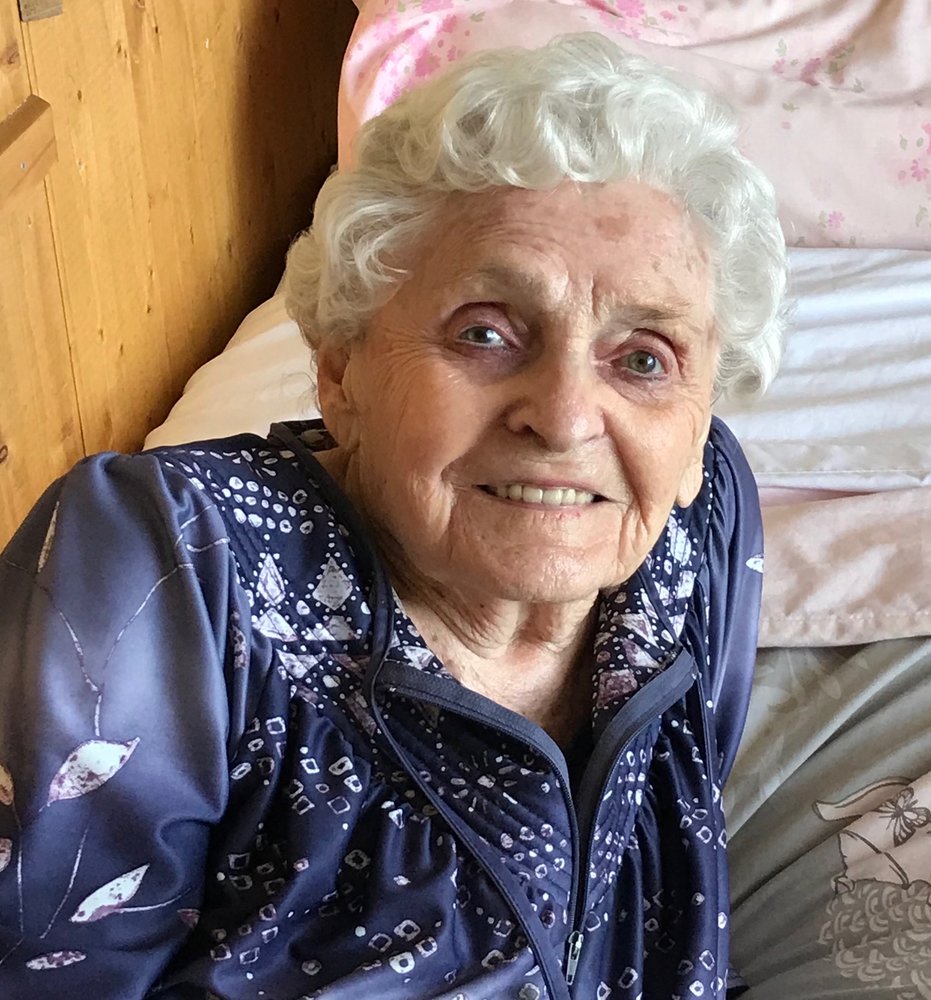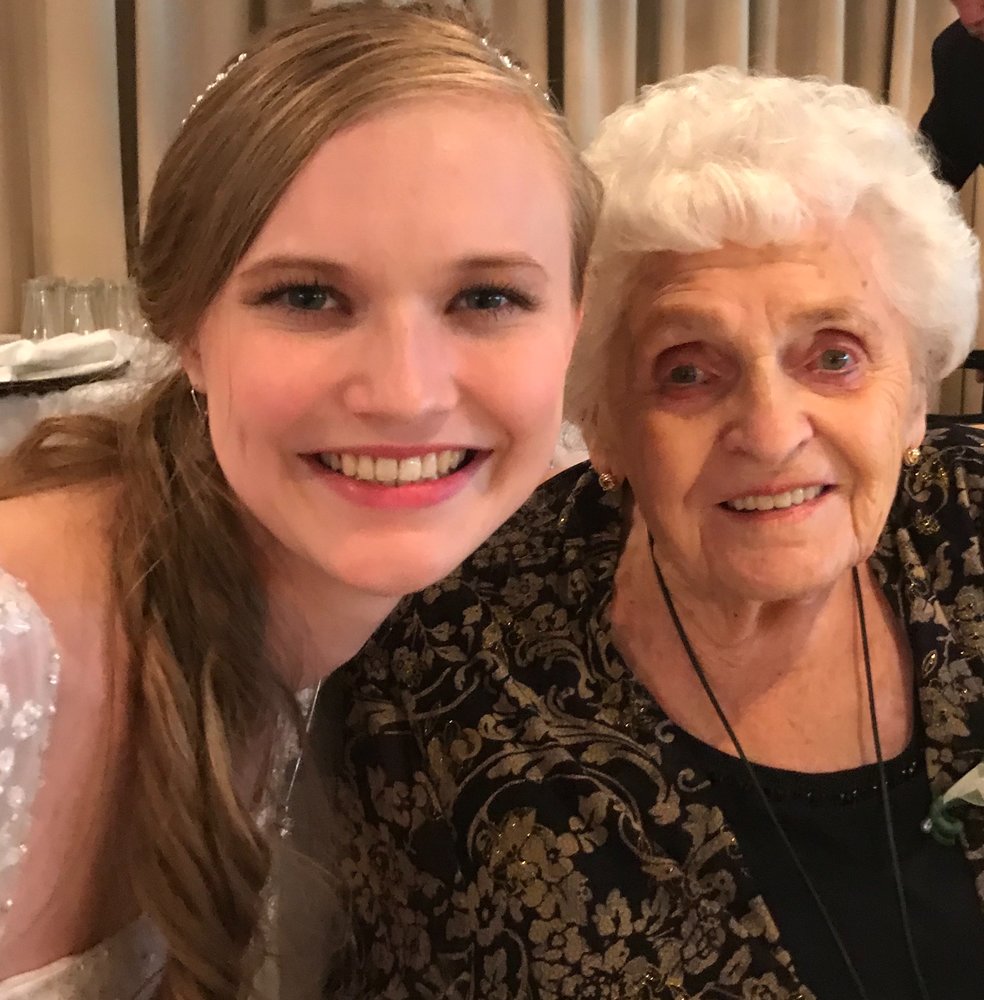





Obituary of Ursula Billing
Ursula Billing (nee Lauer) passed away on October 2, 2020 in her 98th year. She is survived by Werner, her husband of 70 years. Dear mother of Monica (Colan) and Anita (Michael); grandmother of Lowenna (Corey); sister of Jane and Peter (deceased); and aunt of Toby, Simon, Pete, Katina and Kalina.
Due to covid restrictions a private service will be held by the family. In lieu of flowers, donations can be made to a charity of your choice. Condolences may be forwarded through www.humphreymiles.com.
Mama’s Eulogy
A Tribute to Ursula E. Billing
Delivered by her daughters Monica Clarke and Anita Billing
at
Humphrey Funeral Home, Toronto on
October 8, 2020
Monica:
Anita and I want to welcome you and thank you for joining with us in remembering our mother, Ursula Billing, who passed away a week ago.
To begin, we’d like to play for you a piece of recorded music that our father is particularly fond of. It’s by the singing group ABBA and is called “I Have a Dream.” It conveys his wife’s belief in the importance of having a positive outlook and hope for the future.
[PLAY “I Have a Dream.”]
Mama celebrated her 97th birthday last June, having lived a full life on two continents. She saw and lived-through a great many changes during her lifetime.
Ursula Lauer was born in 1923 and grew up in Breslau, Germany. The eldest of three children, she is survived only by her sister Jane (or to us, Tante Hanni), who still lives in Bellville, Ontario, but sadly could not be present with us today. Her much younger brother, Peter, emigrated to Australia many years ago. Upon his untimely death, he left behind 3 nephews and 2 nieces. Air travel, however, made it possible for Mama to meet both her nephew Pete and her niece Tina when they flew to Canada to see her in recent years.
Ursula always had a keen interest in healing and medicine. By age 21 she had completed her studies to become a pharmacist in Germany and was working in a pharmacy where prescriptions were filled the old-fashioned way—by mixing medicines prescribed by a doctor. Her interest in health and healing reemerged a number of times throughout her life.
It was in January 1945, when the Soviet army was sweeping across Eastern and Central Europe, that Ursula, along with her mother and siblings, abandoned their home and all their belongings in Breslau and headed for western Germany. At the end of the war she experienced many interesting and sometimes trying ordeals. Her fortune began to change, however, when she found work with the Americans in the Military Government Offices as a secretary and interpreter.
It was during this time, when Ursula was taking the train home one Saturday evening, that she met a handsome young man already seated in her train compartment. It was our father, Werner Billing, who had recently returned from the war and was now an engineering student at university. From this fortuitous meeting, their romance blossomed. And on January 28, 1950, they were married.
Due to the scarcity of jobs in post-war Germany, our father immigrated to Toronto, Canada, in 1951, to be joined a few months later by his young wife Ursula. They soon settled down in the newly built, planned community of Don Mills, which became their home for the next 65 years. Here they put down roots and raised their two daughters.
Anita:
To us she was always Mama, and when Lowenna was born she became Omi to everyone, including myself at times.
Her family was her life, her joy, her everything. She was therefore the keeper of our family memories. Not a special occasion went by when she didn’t announce, “Okay, time for pictures!”—and we knew better than to argue with her. I know that rubbed off on Monica and me, as I’d find myself having the same urge to capture all family events in photos. We are now so grateful for these photographic treasures, though they are quite voluminous. (I’m talking albums and albums).
Throughout most of her adult life, Mama regularly corresponded with family and friends in Canada, Germany and Australia. In this way she kept our family and friend
community alive and vibrant all these years, even with so much distance between us. She only stopped writing when it became too physically onerous for her in just the last couple of years.
Monica:
She was a wonderful mother during my childhood years. I fondly remember her encouragement in the various activities I wanted to try, like skating, ballet, drama, Brownies and Girl Guides. My least favorite activity was the Saturday morning German School from 10 to 1 o’clock—learning to read and write German. That one wasn’t really my idea. But she was there to help me practice my spelling by dictating words to me. Looking back, I am grateful that I could always communicate fluently in German whenever called upon to do so.
Anita:
I also remember Mama’s tireless efforts in celebrating Fasching
—a German carnival—with our family. With my sister’s creative ideas and my childish enthusiasm for dressing up, Mama figured out how to sew numerous costumes over the years for both Monica and me, from a peacock costume to an I dream of Jeannie outfit. Her costume-making translated into support for my childhood passion of figure skating.
She was so not the typical “skating mother,” as she tried to learn the ropes of the skating world and then sewed countless skating costumes for me, with fabrics that I’m told were very challenging to work with. At the time she was working part- time as a pharmacist assistant, and I know she supplemented my expensive skating lessons with her earnings. (Sorry Papa, not sure if she ever told you that.)
Monica:
When Colan and I moved out West to Saskatoon after we were married, it must have been hard for her to see once again a part of her family moving far away. She now had to add her daughter and son-in-law to her list of weekly correspondents. Mama and Papa did come out to visit several times and, no doubt, were delighted when we returned to Toronto eight years later and settled only a short distance away.
Anita:
I think I was 11 years old when one morning I had Frosted Flakes for breakfast and the next morning I was given Granola. I never saw my Frosted Flakes again. Mama was ahead of her time when she came to embrace nutrition, health food, and a healthy lifestyle, and was a pioneer in the 1970s not only in practicing yoga but in becoming a yoga instructor.
When she was in her 80s Mama volunteered at the retirement home across the street from where she lived. I am still in awe how many people over the years, some just a few years back, would recognize her at the Don Mills Shopping Centre (now known as the Shops at Don Mills) from having taken her yoga classes, or from her volunteering, or from some other community event or program she was involved in.
Mama was always helping people with their health. When she learned of new therapies, she wanted to share them with her family and with others. She even became a certified reflexologist. Her final employment outside of the home was providing aesthetic treatments. She had numerous clients, of which many became her friends. She clearly did something right to have lived such a long and healthy life. Her attention to
good health is also evident in the good care she gave to you, Papa; there you are, joining us in fine form at 98 years old.
Monica:
It wasn’t until she was 75 years old that Mama became a grandmother. Through her darling Lowenna, she was able to relive motherhood as a grandmother. Since Colan and I chose to homeschool Lowenna, Omi assisted during the early years by providing a kindergarten-like school room in her basement, a place where the two of them could play and explore things together.
I was grateful for this support and was pleased to see my mother and daughter form such a loving bond, which remained strong as the baby grew into a toddler, and the toddler into a child, the child into a teenager, and the teenager into a young married woman.
Lowenna would love to have joined us today, but COVID restrictions and a new nursing job in Florida have conspired against her being here. She is, however, following our proceedings on FaceTime and I do, however, have some words of remembrance Lowenna has sent along to read to you.
Lowenna writes,
Omi was a wonderful grandmother. As her only grandchild, I always felt treasured and loved by her. She showered me with gifts and yummy goodies; but more importantly, she always made time for me. When I was young, she played with me for hours on end, took me to the playground, went on outings with me, and hosted me for sleepovers. As I got older, I stayed close with her. I looked forward to our weekly visits and felt like I
could talk to her about anything and everything. I also enjoyed playing piano for her and Opa every week when they lived in the seniors’ home. She appreciated the music so much. Christmases with Omi were particularly fun. We decorated her tree together, wrapped Christmas presents, made rum-balls for our family and friends, and ate delicious German Christmas cookies at coffee- time with Opa. Many times I’ve wished I could go back and re-live those years, but I realize I was very privileged to have had my Omi around for so long. I’m especially grateful that she lived long enough—and stayed healthy enough—to meet my future husband, Corey, see me wed, see me graduate from university, and hear about my first job as a nurse. She led a good long life, but I’ll always miss her very much. I love you, Omi.
One of Omi’s favorite piano pieces that Lowenna used to play was Lilly Marlene. Lowenna found an old recording she had made of herself playing this piece. It is part of a medley she performed many times for Omi, Opa and others at the seniors’ residence on the Donway. We’d like to play the recording for you now.
[PLAY “Lilly Marlene.”]
It was important for me to continue some of the German traditions Omi brought from ‘the old country”; they became our family traditions here in Canada. Our German-style Christmas celebration was always on Christmas Eve, whether at the Billing home, her sister Jane’s home, my home—and, in the last few years, at Omi and Opa’s seniors’ home on the Donway. Even though I did not carry on her childhood Christmas Eve meal of Fish Sauce, we continued the German “New Year’s Meal,” which became our special Christmas Eve
dinner, with a roasted bird—usually a goose, but more recently turkey—Klösse (potato dumplings) and Bluekraut (red cabbage). I also love making Omi’s favourite cake, Linzer Torte, a raspberry jam almond cake with fresh whipped cream.
These culinary delights and other small German traditions have now been passed on to Lowenna, and it looks like she and Corey might continue some of them in their home too.
In her later years, Omi liked to give out sweets to all who came to visit. She made peanut butter balls and rum-balls for visitors and friends. More recently, she got into the habit of giving people chocolate balls manufactured by the famous Swiss confectioner Lindt. (You know, I see now that she seemed to have had thing for spherical treats in her senior years.) She was always trying to make people happy.
Anita:
When her precious Lowenna arrived on the scene, Mama gladly gave up her yoga, volunteering, and work as an aesthetician to make time to help care for her beloved granddaughter. Those years, seeing Lowi grow up, I know, were some of the happiest years of her life. She was thrilled to see Lowenna get married last year, and on January 28th of this year she reached the incredible milestone of 70 years of wedded bliss with you Papa, her true soul mate.
We would like to share with you a video recently recorded by Michael of Mama and Papa singing a round together we call “The Elephants.”
[PLAY “The Elephants”]
Monica:
Omi led a very rich and full life. Teacher, healer, friend, wife, mother, and grandmother, she was always there for those who needed her. The woman who repeatedly bounced back from adversity, including several falls in later life, was unable to surmount her last challenge. This time it was goodbye. Your family and your many friends were greatly enriched for having known you; we love you, and we will miss you very much.
Anita:
I’d like to end on a very personal note. It may sound silly, but I loved my mother’s hands. They caressed me, held me, stopped me from falling, comforted me, and once even held me upside down when I was 4 years old to dislodge a candy I was choking on. When I was little, I used to ask her if I could take her hands with me wherever I was going. To me her hands embodied her spirit.
I treasure the memory of the warmth I felt when she tucked me in at night. I felt so comfortable and safe. I also remember being awakened by her happy and loving voice. She’d use a pet name to rouse me: “Mäusel,” she’d say, “it’s time to wake up!”
Mama, I thank you for being my mother, for being my best friend, and for all the unconditional love you enveloped me with over the years, love that I always knew and never doubted for a second.
I miss you and love you very much. Schlaf gut. Süsse träume. I love you.
* * * *
We have a message from Margaret Day, a friend Mama made while living at the Donway seniors’ residence. I’d like to read it for you, if I may.
[READ DAY’S MESSAGE]
Mrs. Day writes,
I met Ursula soon after I moved to Revera in 2012. We “discovered” each other !
We were born in the same year and this prompted Ursula to ask me about growing up in Britain during the War while she was doing likewise in Germany. She wanted to compare our lives from the opposing sides of “the battle.”
I was privileged to read Ursula's Memoirs and so understood her side of the conflict. While I volunteered with the Royal Navy and served as a “Wren,” Ursula had no concept of women as part
of Germany’s army. Her life as a pharmacist took her to different parts of the country where she assured me she was still far from the fighting; all of which changed when the Russians invaded.
Then Ursula met a very handsome man . . . in a train she told me .
. . who was to become the love of her life . . . her Werner . . . for over 70 wonderful years.
When the War ended Ursula and Werner moved to Canada, to Toronto, where Werner was instrumental in planning and designing the new “Don Mills.”
Ursula and I spent many happy hours in interesting and stimulating conversations over “Afternoon Tea.” Yes, I persuaded her to partake of this English ritual !
Dear Ursula, I valued and treasured our friendship so much. I miss you.
Margaret Day
Thank you, Margaret.
[Michael Stroud then said a few words in fond remembrance of the deceased.]
Anita;
Thank you again everyone for coming. That concludes our remembrance service for this afternoon.
[PIANIST PLAYS Amazing Grace for the recessional. ]








